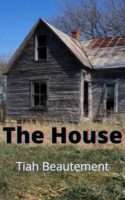“Yeah,” Ximena said. “My father’s a good example of that. When he died, he left Mamá and me with his debts. Gambling debt, and nothing Mamá said or did seemed to change it.”
Jordan nodded, as his fingers danced along the strings.
“The thing is,” Ximena said, “he wasn’t all bad, my father. I mean, he held down a job and I don’t think he ever cheated on Mamá with another woman, at least not that I’ve heard. And I really think he loved us. It was also him who got me into music, knowing the trivia, and all that. But then he died and, as you say, life got done to us.”
“So, what you going to do about it?”
“I study my butt off. Well, usually. Until you pulled me away from my books.”
Jordan’s hands stilled. “What? You saying you’d still be studying now, if I hadn’t dragged you over here?”
She scratched her knee, glancing up at his face. “I didn’t have to follow, so can’t really blame it all on you. But yeah, school, chores, and studying, that’s pretty much my life.”
“And how you think studying is going to change it?”
“I’m going to learn how to make money. Real money. Get Mamá and me out of here. Because money is power, right? So I’m going to make it and have some of that power, myself.”
Jordan nodded.
The House went quiet. Like it was thinking. Ximena licked her lips again, hoping what whatever was on this spooky place’s mind, it wasn’t bad. A chill swept over her. What if this was it? What if this is where she died? All that studying, and nothing.
The sound of water sloshing caught her attention. Floorboards flicked near the hole, rippling like piano keys. This reminded her of Papá, who would play the instrument any time one was available. He didn’t know many songs for the piano, but one he’d memorised was “Border Song” – aka Holy Moses.
The House stilled, as if it could hear her thoughts.
She could understand why The House might like “Border Song,” given what the women at The House had probably suffered. The song was originally sung by Elton John, and the lyrics had spoken of the alienation of gay men in society. But when Aretha Franklin created her cover version, her voice and stature turned it into a powerful song about black endurance against the onslaught of bigotry. Papá had loved Franklin’s version so much, he’d owned it on vinyl.
All Ximena had to do was close her eyes and she could hear the woman’s low, soulful gospel sound. After a deep breath, Ximena released the first line, appealing to Moses to hear her words of woe. This song was made for her voice. Deep notes, ones she could scoop up and release into the air, round and full-bodied, containing strength and fortitude.
The House straightened, and Jordan began to follow along with his banjo.
Ximena paid neither any mind. She collected the pain she’d felt from Jordan, the hurts of her past, her fears for the future, and the sorrow soaked into The House, and released it all to the heavens. She pleaded to the water below The House, and the sky above, for peace that she, herself, had never truly felt in her soul.
She didn’t notice the walls fade.
She didn’t watch the roof dissolve.
She didn’t hear the birds fly in.
She didn’t feel the floorboards beneath her turn to rich soil as plants sprouted.
She didn’t notice the hole fountaining into graceful arcs.
She only focused on the song, singing and singing until her voice had run through “Border Song” four times.
Jordan played on, the notes from his banjo threading beneath her fierce and mighty voice.
When the last note rang out of her powerful lungs, that’s when she heard it. The soft sigh, as if whatever had existed on this land before had finally found relief and eternal rest.
***
Tell us: The music here seems to be giving peace to those listening. What gives you peace, when you are upset or stirred up about something?

